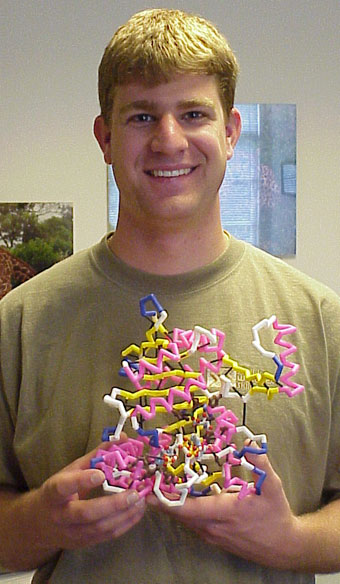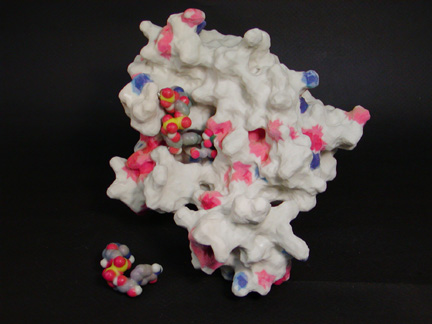![]()
![]()

This work is sponsored in part through an NSF-ILI
grant.


Left: Brian Strife ('02) with the model of IDH that he
painted.
Right: Surface model of IDH with removable NADP+
and NAD+ .
Image of IDH (blue) from E. coli, as depicted with Jmol, shows NADP+ and isocitrate (both in red) bound to the enzyme. Try:
Chime Tutorials (by Rahul Karnik '00)
- IDH Tutorial #1: E. coli IDH monomer with isocitrate, NADP+, and Mg2+
- IDH Tutorial #2: E. coli IDH with NADP+ and Ca2+
Quicktime Movies of IDH
- IDH monomer with substrate, coenzyme, cofactor bound. (large format 10MB)
- IDH dimer with substrate, coenzyme, cofactor bound. (large format 10 MB)
Raw PDB Files
The Biology Department at Davidson College has begun to develop isocitrate dehydrogenase (IDH) as a model enzyme for teaching. We presented this model system at the 1998 ASCB meeting and you can see a virtual poster summary here. Over the next year, we will be adding new protocols to this page for use in a wide range of courses, including:
Click Here for a good review of Microplate Readers (including contact information and pricing) that was published in the July 6, 1998 edition of The Scientist.
The idea of using IDH as a unifying enzyme was first discussed in the spring of 1996. IDH has many advantages over more traditional enzymes (e.g. tyrosinase, peroxidase, and amylase) used in laboratory courses. IDH is a enzyme that is frequently discussed in many courses, IDH requires no toxic substances to monitor the formation of one product (NADPH), and there is a great deal of information available on the enzyme and its kinetics so many variables can be manipulated by students.
Here are some other resources which demonstrate the flexibility of IDH as a model enzyme: